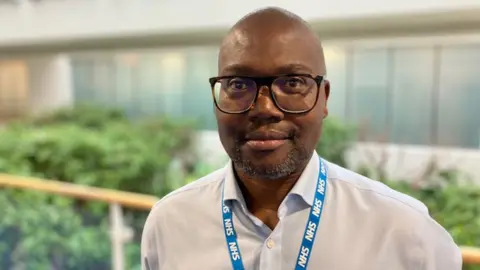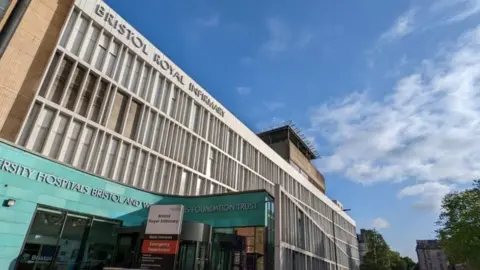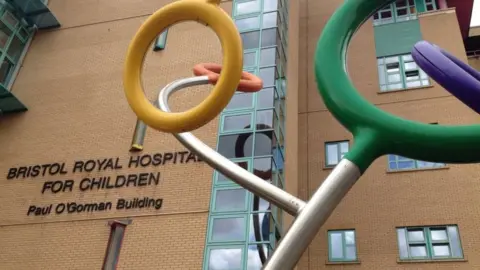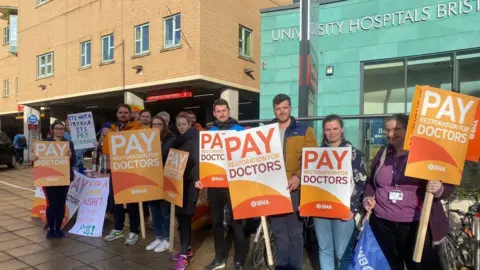End doctors' pay dispute, says Bristol's hospital boss
 BBC
BBCThe boss of the biggest hospital in the South West has called on government and the health unions to resolve the doctors' strikes.
Former mental health nurse Eugine Yafele was appointed chief executive of University Hospitals Bristol and Weston NHS Foundation Trust (UHBW) in January 2022.
But what challenges has he faced and what is he doing about record waiting lists?
When Eugine Yafele started his new job in May last year, there were 7.2 million people waiting for NHS treatment in England, which was a record high.
UHBW itself had had to reduce operations to 80% of pre-pandemic levels.
Since then the figure has risen to 7.5 million, partly as a result of NHS strikes which account for more than 750,000 cancelled hospital appointments across England since the beginning of the dispute.
'Bring disputes to an end'
However, Mr Yafele said despite the "very challenging" circumstances, his hospital trust has been able to "make a step-change in the number of operations" and are now operating at "about 100%" of pre-pandemic levels.
"I think that has [happened as a result of] a lot of good will: my colleagues have been running extra clinics over weekends and bank holidays," he said.
But with the prospect of BMA consultants walking out on 19 and 20 September and junior doctors continuing to strike over pay, how does Mr Yafele see the future?
"The junior doctors' strike - or any industrial action - is a job for government and the unions. [I] would absolutely encourage them to get round the table and bring these disputes to an end," he said.

He said while the hospital has plans that are "pretty well understood" in terms of how it plans for strikes. It was "still difficult" because "patient care is delayed".
He said that despite the challenges, they have maintained patient safety through each period of industrial action.
'Improving picture'
Named as number six in the top trust chief executives in England by the Health Service Journal this year, Mr Yafele is in charge of a workforce of more than 13,000, delivering over 100 clinical services across 10 Bristol sites, including the Eye and Dental hospital, St Michael's maternity hospital and the Bristol Oncology Centre.
When he took up his post the government had set a target of zero patients waiting more than 78 weeks by April 2023.
However, by that deadline UBHW had around 190 patients still waiting for longer.
Mr Yafele said that figure is now down to around 100 patients and while they are having to "to cancel, rebook or sometimes delay booking patients" due to industrial action, the "picture is improving".

The UHBW has 1,132 beds and about 15,000 staff members with an annual operating expenditure budget of £1,061m.
He said they were putting on extra clinics and working with other local health care partners, including Southmead Hospital.
"We have no patients waiting over 104 weeks. We've also got the 62-day cancer standard [for treatment]."
He said the trust intends that by the end of March 2024 "there will be no one waiting more than 78 weeks" for treatment.
'Cancellations a last resort'
The Bristol Children's Hospital is also part of UHBW and has struggled at times to meet demand for planned treatment.
However, Mr Yafele said that the hospital is the "major paediatric trauma centre for the South West" and insists cancellations have only happened because of prioritising emergencies and as "a last resort".
"I think the distress that causes for the families - particularly when they've got to travel a long distance - it's something that we're absolutely attuned to," he said.
Possible Southmead merger?
The prospect of UHBW merging with the other major hospital in Bristol, Southmead, has been the subject of conjecture.
This is because many specialists believe it would be safer to have all trauma services on one site.
At the moment patients with brain trauma have to go to Southmead. But if they also have lung damage, that would involve being transferred to UHBW's Bristol Royal Infirmary.
Consultants have told me that is "unsafe", but Mr Yafele does not believe patients are risk as a result of the arrangement.

"It would be ideal to have everything that a patient needs on one site.
"But I wouldn't say it's dangerous. Our clinicians are looking at this and I don't think they would preside over something that's not safe."
Asked if he can see a future with a single hospital trust for Bristol, Mr Yafele replied: "There is the seduction of thinking about a single trust as a solution to everything.
"I think there is so much that we can do as two trusts - and that we are doing - to improve acute care for the people of Bristol."

Follow BBC West on Facebook, Twitter and Instagram. Send your story ideas to: [email protected]
